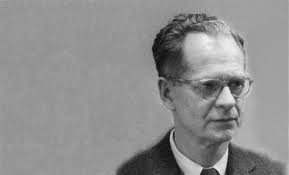Burrhus Frederic Skinner was an American psychologist famous for his work in the area of behavioral psychology.
Early life
Burrhus Frederic Skinner was born on March 20th, 1904, in the town of Susquehanna, Pennsylvania. Skinner’s father was a lawyer while his mother stayed at home to take care of the household. He had a younger brother who died from a cerebral aneurism at the age of 16. Since young age, Skinner enjoyed working with his hands. In his spare time he would build anything from roller scooters to more complex devices.
Education
B. F. Skinner attended elementary and high school in his home town of Susquehanna. Afterward he attended Hamilton College in New York with the intention of becoming a writer. While fulfilling his ambition to be a writer, he attended the Middlebury School of English in Vermont, where he met Robert Frost and wrote his first book. Soon after, Skinner realized that he didn’t have much to offer as a writer, so he turned his focus to psychology. Upon receiving his bachelors degree, Skinner attended Harvard college where he earned his Ph.D.
Achievements
While a researcher at Harvard, B. F. Skinner invented what he called “the operant conditioning chamber”, or popularly known as the Skinner box. The whole contraption was consisted of a chamber where the subject would be inserted (usually a rat or a pigeon) and a lever which would dispense food when activated. During his experimentation with rats, Skinner noted that the subject rat would usually sniff around and explore the chamber. While doing so, the rat would accidentally pull the lever and a drop of food would fall in. Skinner noticed that following the first drop of food, the subject would utilize the lever increasingly to the point where he is no longer hungry. From this experiment, Skinner derived that if the consequences were bad, there was a high chance that the action would not be repeated; however if the consequences were good, the actions that lead to it would be reinforced. He called this “the principle of reinforcement” which is the foundation of behaviorism. Following this experiment, Skinner began to shape his own philosophy of science called radical behaviorism, and founded his own school of experimental research psychology—the experimental analysis of behavior which culminated in his work called Verbal Behavior. For his contributions to behavioral psychology, B. F. Skinner is considered to be a pioneer of modern behaviorism and the most influential psychologist of the 20th century.
Later life
In 1936, Skinner married Yvonne Blue and had two daughters, Julie and Deborah. He died of leukemia on August 18th, 1990, and was buried in Mount Auburn Cemetery, Cambridge, Massachusetts.
B. F. Skinner quotes
“We must delegate control of the population as a whole to specialists——to police, priests, teachers, therapies, and so on, with their specialized reinforcers and their codified contingencies”
“Education is what survives when what has been learnt has been forgotten”
“It is a mistake to suppose that the whole issue is how to free man. The issue is to improve the way in which he is controlled”

